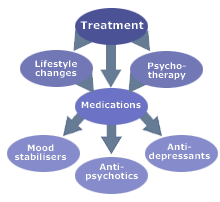
Welcome to Carrie Mathison's Diary- a fan site about Homeland and Carrie Mathison
Treatment for Bipolar Disorder
Treatment for bipolar disorder usually includes medication and sometimes psychoeducation or therapy such as cognitive behaviour therapy to manage depressive symptoms in particular. As bipolar disorder is a lifelong condition, it is necessary for a person to continue to take medication indefinitely to help prevent further manic or depressive episodes.


Medication for bipolar disorder can feel a bit like trial and error at first as it is necessary to try different combinations of medications to find out what works best for the person with bipolar. There are different types of medication that are effective for bipolar disorder including mood stabilisers, anti psychotics and sometimes anti depressants in combination with a mood stabiliser for persistent depressive episodes. It usually takes a few different combinations to discover what works best for the individual and the medication is usually taken on a long term basis to stabilise mood and prevent a person from becoming unwell.
Along with medication, psychotherapy can also be useful for treating bipolar disorder and managing symptoms such as intrusive thoughts or extreme mood fluctuations. This could consist of psychoeducation to understand more about the condition and what it entails or other therapies such as cognitive behavioural therapy, interpersonal therapy or group therapies. This can help a person to fully understand and learn to mange their symptoms but does not 'cure' bipolar disorder.

Taken from www.bipolarlifeline.com

Sometimes it is necessary for a person with bipolar disorder to be admitted to hospital to manage or treat more severe symptoms such as suicidal thoughts and behaviours or if the person is considered to be a serious risk of harm to themselves or to other people. The admissions are usually a result of manic episodes where a person puts themselves or others in vulnerable or risky situations or during a depressive episode where a person is considered at considerable risk of suicide. The admissions are normally kept as short as possible to minimise disruption to the person's usual routine but are as long as necessary to manage risk. In Homeland, we see Carrie admitted as an inpatient following a manic episode in season one and again (contraversially) in season three but both of these admissions are time-limited and Carrie is allowed home once her symptoms are under control.
Self help strategies can also be beneficial for people with bipolar disorder in combination with other treatment. In season three, Carrie tells her father that she's started her own 'treatment' consisting of running six miles a day and meditating which, if she had combined it with medication and/or other treatment, could be really useful. As with many mental health issues, eating a balanced diet and exercising regularly can really help with managing moods and symptoms as well as getting plenty of sleep, avoiding alcohol and drugs, learning to recognise triggers of a relapse and staying away from unhealthy relationships or situations that could cause distress. In season five, we find out that Carrie has been sober from alcohol for two years, is taking her medication, sleeping regularly, exercising and is in a healthy relationship which has helped her to control her illness and live a 'normal' life, at least for a while.



